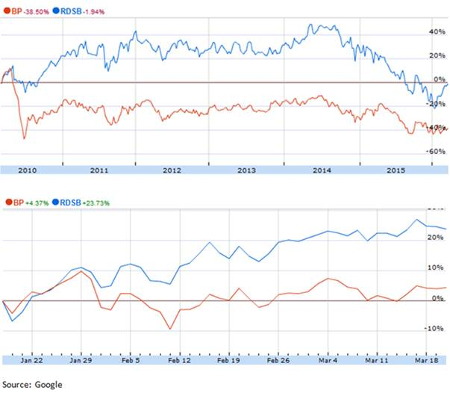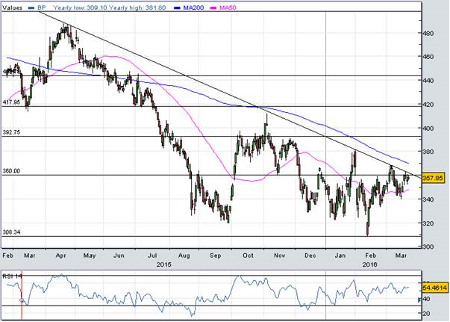Why BP is worth 50% more
22nd March 2016 13:09
by Lee Wild from interactive investor
Share on
Not a single oil company escaped the crash when crude prices plummeted from over $115 a barrel to $27 between summer 2014 and 20 January this year. Oil major lost half its value on the way to a seven-year low, and briefly yielded over 10%. A stunning rally in the past eight weeks may have further to run but, offering more relative upside, becomes Barclays' top pick.
BP has struggled ever since the Deepwater Horizon oil spill in April 2010. Despite the oil slump, Shell shares trade little changed since. BP is down over 38%. Investors argue that BP is ex-growth and has nothing in the portfolio post 2020.
"We firmly believe that this is not the case, with close to 800 thousand barrels of oil equivalent per day of production due on stream and, more importantly, with cash margins 35% higher than the current portfolio," says Barclays oil analyst Lydia Rainforth.
"Our analysis shows that the sanctioned projects have the potential to add $4 billion [£3 billion] of cash flow net of decline by 2020 [more than 20% of BP's 2015 cash flow] and up to a further $1 billion potential upside from projects that are yet to be sanctioned, but could be on stream by that point."

Don't expect a marked difference in 2016 - Barclays forecasts broadly flat volumes this year - but there should be a "meaningful" pickup in volumes from next year. Expect an average of 3-4% annual growth between now and 2020.
Rainforth believes some of the extra cash flow anticipated by 2020 will be priced in ahead of delivery. An 18% cut in corporate and functional costs - mainly streamlining operations and squeezing the supply chain - is encouraging, but there is more to do.
"This additional cash flow from projects coming on stream combined with the continued effort to reduce the cost base, particularly at the corporate level, should enable BP to maintain and even grow the current dividend level over the coming five years," writes Rainforth.
"As a result, we see the 7.5% yield and 54% potential upside to our 550p per share price target as compelling and we rate the stock 'overweight'.
"With BP offering more relative upside than Shell, BP now becomes our Top Pick."

Barclays currently expects flat adjusted net income in 2016 of $5.9 billion, giving a small increase in adjusted earnings per share in sterling of 22p. That puts BP on a forward price/earnings ratio of 16.3 times. Shell, at 1,691p, trades on 18.6 times.
Both majors are tipped to grow earnings significantly in 2017 - BP up 77% to 39p and Shell to 243 cents. That drops BP's multiple to just 9.2 times and Shell's to 10 times. Both companies are also tipped to keep paying tasty dividends, generating a yield of well over 7% for the foreseeable future.
Despite not being Barclays' "top pick", the broker still rates Shell shares as 'overweight' and thinks they're worth 2,450p.
This article is for information and discussion purposes only and does not form a recommendation to invest or otherwise. The value of an investment may fall. The investments referred to in this article may not be suitable for all investors, and if in doubt, an investor should seek advice from a qualified investment adviser.